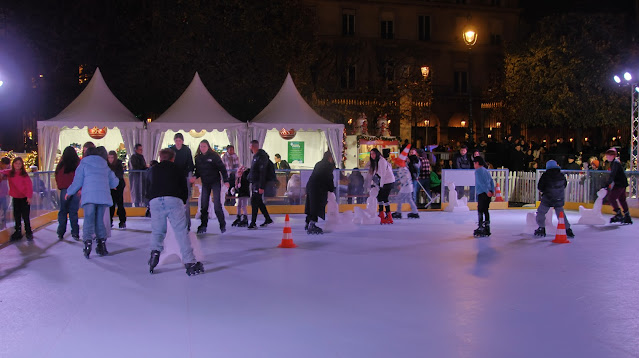 |
| @Marlene Koenig |
News and commentary about the reigning royal houses of the United Kingdom, Sweden, Denmark, Norway, Belgium, Luxembourg, Liechtenstein, the Netherlands, Spain, Monaco -- and the former European monarchies as well.
 |
| Place de la Concorde |
Back in Paris, I headed to the Place de la Concorde stop as I wanted to walk to the Christmas market at the Tuileries. Thankful for my new scarf, I was no longer cold.
 |
The market was crowded! I decided to have sausage and petit frites for dinner—and a beer. I do not know what brand of beer I was drinking, but it was good. I hope it was a German beer, as this was a German food stand.
 |
| Rudolph the Red-Nosed Reindeer - in Paris |
The market included several rides, including the reindeer ride. I came close to buying a ticket for the reindeer ride but decided against it. The market was certainly influenced by American culture, including Santa Claus and Rudolph the Red-Nosed Reindeer.
 |
| Real American Corn Dogs!!! People were in line to buy them. |
 |
| Snails and frogs legs - the stand next to the Real American Corn Dogs! |
 |
| It took several shots to get the Olympic rings |
 |
| Yes, that is a cow |
There were many food choices. I laughed out loud when I passed a stand offering REAL AMERICAN CORN DOGS!! What??? in Paris at a Christmas market. Corn Dogs in Paris?
It was one thing to see Rudolph but corn dogs!!! I walked past that stand. The next stand offered French cuisine: Escargot and Grenouille. Neither piqued my interest.
The end of the market was the La Roue de Paris. I have never been on the London Eye or the Capital Wheel at the National Harbor in Maryland. I am not scared of heights. I like going fast.
I looked at the Wheel and the short line. I decided to ride it. It was nearly nine p.m., as I got into one of the wheel's cars. The couple in front of me let me go ahead of them, allowing me to have a sparkly surprise. The Eiffel Tower's light show runs 5 minutes every hour on the hour.
I had a great time on the wheel!!
 |
| Sacre Coeur from the Wheel |
 |
| Synthetic ice |
I bought a hot chocolate to savor as I walked to the Palais Royal Metro stop, heading back to my Air BnB. Tomorrow will be my final day in Paris, and another full day. No time for jet lag, not this trip.
November 23rd was a cold, damp, and windy day. I took the RER C to Versailles, the closest station to the palace. The train ride to Versailles is an hour. Much to my dismay, the train has no bathrooms!!
Snow was still on the ground in Versailles, and the palace was crowded. I can only imagine how worse the crowds are in the summer. The Hall of Mirrors was breathtakingly beautiful.
 |
| I am not a tall person. I held my camera as high as I could in the Hall of Mirrors. |
 |
My ticket included Petit Trianon. At the last minute, I decided to skip the estate as it is a 25-minute walk each way. It was too cold and icy. I bought the guidebook, and there are many photos. A shuttle between Versailles and Petit Trianon might be a good idea.
There are several places to eat at the Chateau. I had lunch at Angelina's Tea Roo, After visiting the gardens, I wandered into the Grand Café d'Orleans and ordered a hot chocolate. The young man handed me the steaming, can't-wait-to-drink delicious liquid delight. I offered the young man my credit card to pay, but he did not take it. He smiled and said, "Enjoy." I responded: "Merci beaucoup!"
https://en.chateauversailles.fr/discover/history/key-dates/hot-chocolate-versailles
I bought two books in the palace's store: Visit Versailles (Official Guide) and Versailles in Private/Versailles privé. The latter book, written by Nicholas B. Jacquet, is in French and English.
I left Versailles shortly before the doors closed at 5:30 p.m. On the way back to the train station, I stopped in a souvenir shop where I bought a new pair of gloves (one is somewhere at Versailles), a matching scarf (Pink), and a Versailles keyring that I turned into a Christmas ornament. The bill was under $20.00. That scarf kept me warm the rest of the night as I took the train back to Paris and a walk through the Christmas market at the Tuileries -- and that will be another post.
https://en.chateauversailles.fr/
Books about the Chateau de Versailles.
https://royalbooknews.blogspot.com/2024/12/books-on-versailles.html